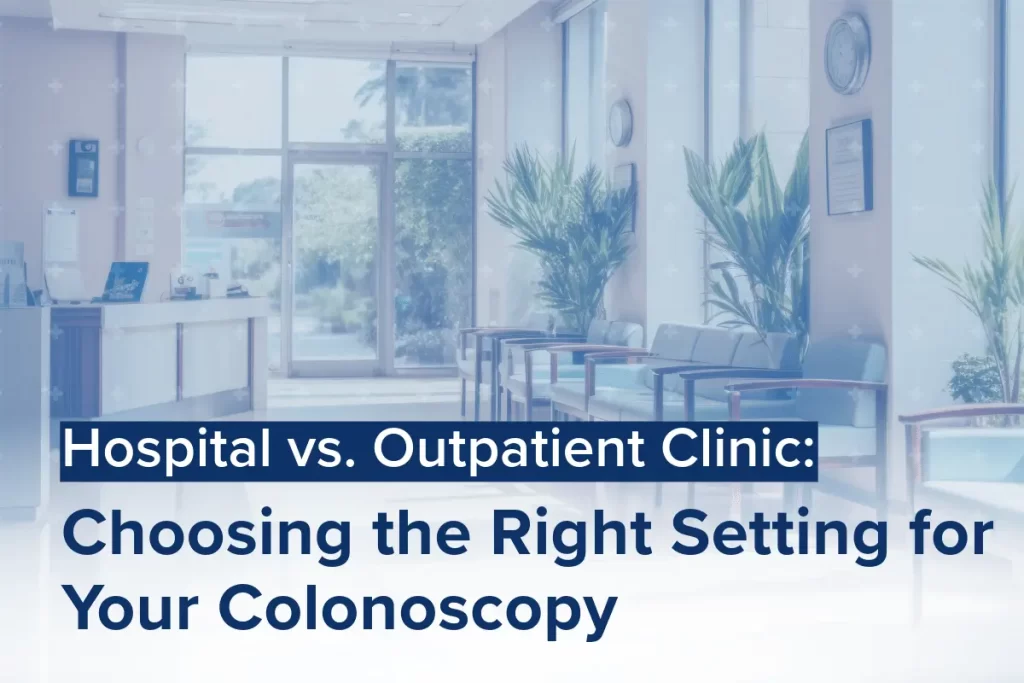Table of Contents
ToggleSchedule Your Procedure Today
- All-Inclusive Service
- Board-Certified Physicians
- Transparent Pricing
Deciding where to have your colonoscopy? Should you opt for a hospital or choose an outpatient clinic? What are the key differences, and which setting will give you the best experience?
Whether it’s about cost, convenience, comfort, or the quality of care, making the right choice can impact your procedure and recovery.
This guide will help you compare hospitals and outpatient clinics for your colonoscopy, so you can make an informed decision based on your needs, preferences, and budget.
The Basics of Each Setting
Before diving into the pros and cons, it’s helpful to understand the basic setup for colonoscopies in both hospitals and outpatient clinics.
While both settings aim to provide high-quality care, there are differences in their focus, staffing, and overall environment.
Hospital Colonoscopies
Colonoscopy procedures conducted in hospitals typically take place in the gastroenterology or endoscopy departments. Hospitals are equipped with specialized medical staff, including anesthesiologists, nurses, and technicians trained to handle a range of medical conditions.
They also offer a full range of monitoring facilities, which can be particularly beneficial for patients with complex medical histories.
Outpatient Clinics
Outpatient clinics, also known as ambulatory surgical centers (ASCs), focus on routine medical procedures. They are dedicated to outpatient care and are designed to offer streamlined, efficient services.
These centers tend to have specialized teams and equipment for colonoscopy procedures, with an emphasis on providing high-quality care in a more convenient and affordable environment.
Extended Time Preps
Flexible timing options are another breakthrough. These allow patients to space out their prep over a longer period, such as doing part the evening before and part the morning of the procedure. This split-dose approach has been shown to result in better colon cleansing and less discomfort.
Pros and Cons of Colonoscopy at a Hospital
Hospitals offer a broad range of services and are equipped to handle emergencies and more complex medical conditions. However, there are some trade-offs, such as higher costs and longer wait times.
This section explores the pros and cons of having your colonoscopy in a hospital setting, helping you decide if it’s the best choice for you.
| Pros | Cons |
|---|---|
| Comprehensive medical care: Hospitals can manage complex cases and emergencies effectively. | Higher cost: Hospital procedures tend to be more expensive due to overhead costs. |
| Specialized staff availability: Anesthesiologists, nurses, and specialists are available for various medical conditions. | Longer wait times: Higher patient volumes lead to potentially longer scheduling times. |
| Comprehensive aftercare: Recovery and post-procedure follow-up are managed within the same facility. |
Pros and Cons of Colonoscopy at an Outpatient Clinic
Outpatient clinics are typically more affordable and convenient for routine procedures. However, they may not be suitable for patients with complex health conditions or those who require emergency care during the procedure.
This section breaks down the pros and cons of outpatient clinics to help you determine if this is the right setting for your colonoscopy.
| Pros | Cons |
|---|---|
| Cost-effective: Lower operational costs make outpatient clinics more affordable. | Limited emergency care: Outpatient clinics are not as equipped to handle emergencies. |
| Quicker scheduling: Faster scheduling due to streamlined processes, especially for routine colonoscopies. | Not ideal for complex cases: More complex medical conditions may require a hospital setting. |
| Convenience: Less waiting time and a more efficient, comfortable experience. |
Factors to Consider When Choosing Your Setting
Choosing the right setting for your colonoscopy depends on several factors, including your health, financial situation, and personal preferences. In this section, we’ll explore key considerations to help guide your decision-making process.
Cost Considerations
One of the most significant factors to consider is the cost of the procedure. Hospital-based colonoscopies tend to be more expensive, often due to higher operational costs. However, if you have insurance, some plans may cover a significant portion of your hospital-based colonoscopy, though out-of-pocket costs can still be high.
A 2023 study led by Johns Hopkins researchers found that hospital facility fees for colonoscopies were, on average, 54% to 61% higher than those at ASCs for the same procedures, even when comparing facilities in the same county and under the same insurer contracts.
Outpatient clinics are often more affordable, especially for self-pay patients. If you’re concerned about cost, reviewing your insurance coverage and any available self-pay options can help guide your decision.
Health Condition and Risk Factors
Your health condition plays a vital role in choosing where to have your colonoscopy. If you have a complex medical history or are at a higher risk for complications, a hospital might be the safer choice, as they can provide immediate access to emergency care and specialized medical teams.
On the other hand, if you are healthy and have no significant risk factors, an outpatient clinic could be a suitable and more affordable option.
Convenience and Comfort
Consider the convenience of each setting in terms of location, wait times, and overall experience. Hospitals may require more time for scheduling, and the larger, more formal environment might not offer the same comfort level as an outpatient clinic.
Outpatient clinics tend to provide a quicker, more comfortable experience, but they may not offer the same level of specialized care for complex situations.
Final Thoughts
Choosing the right setting for your colonoscopy depends on factors like cost, convenience, risk, and comfort. Hospitals offer comprehensive care for complex conditions, but outpatient clinics provide a more affordable and efficient option for routine procedures.
If you’re ready to schedule your colonoscopy, ColonoscopyAssist offers affordable, transparent pricing options designed to minimize colonoscopy costs. With a nationwide network of accredited providers, we ensure that your colonoscopy is accessible, cost-effective, and tailored to your needs.
Disclaimer
Before making any decisions regarding anesthesia, sedation options, colonoscopies, or any medical procedure, always consult with your physician, anesthesiologist, or qualified healthcare provider. This article should not be used as a substitute for professional medical advice, diagnosis, or treatment.
EXCELLENT rating
Based on 2125 reviewsTrustindex verifies that the original source of the review is Google. I was referred to ColonoscopyAssist through my healthcare sharing ministry. They communicated with me every step of the way and were a lower-cost solution to getting a colonoscopy since my preventative screenings aren't covered. I got mine done through a very reputable endoscopy group and they were wonderful.Trustindex verifies that the original source of the review is Google. The entire process was seamless and the staff was friendly and professional. Overall. I had a wonderful experience at your facility.Trustindex verifies that the original source of the review is Google. After the initial, sign up with ColonscopyAssist, it took about 2-3 weeks to get a call from doctors office and appt was 2 weeks later. Everything went smoothly, the doctor was not personable but was professional. Glad it is done. Now my husband has peace of mind.Trustindex verifies that the original source of the review is Google. Simple and easy with great savings.Trustindex verifies that the original source of the review is Google. ColonoscopyAssist was very helpful, responsive, and made the process happen smoothly, not to mention made the procedure much more affordable.Trustindex verifies that the original source of the review is Google. This was as easy as it could have been! Competent and Professional are words that come to mind. This is a great program. From beginning to end it proceeded without a glitch!Trustindex verifies that the original source of the review is Google. Everything worked well before, during and after procedure. Got lots of information. Only ask to upgrade the guide when people are taking tables and not a liquid prep.Trustindex verifies that the original source of the review is Google. very professional and friendly service, everything was organized and I was advised on all the steps. they made this process simple.


















